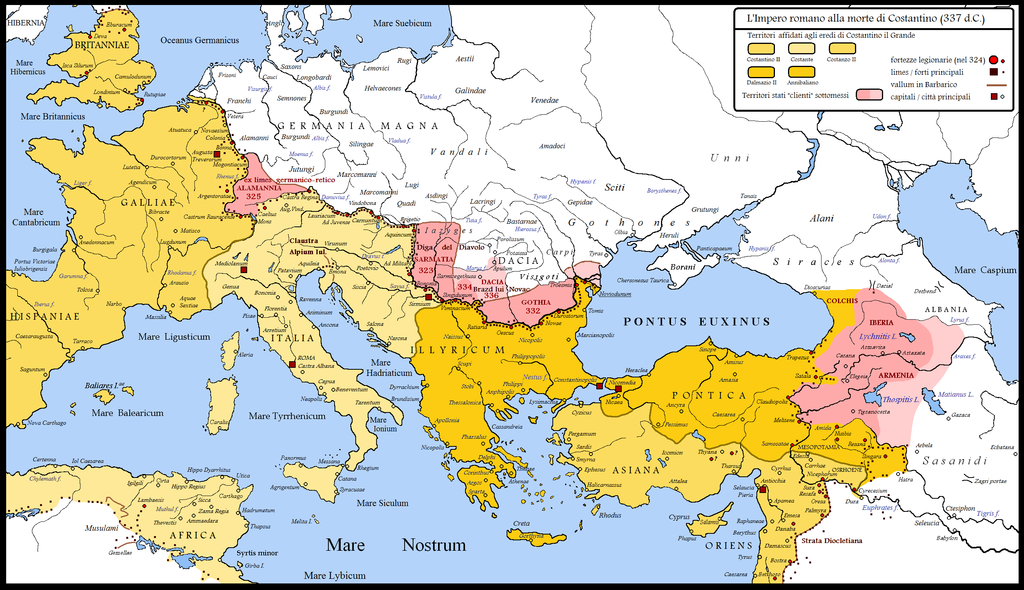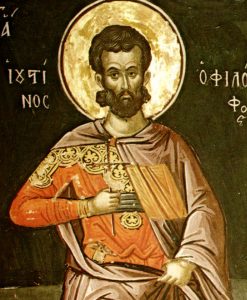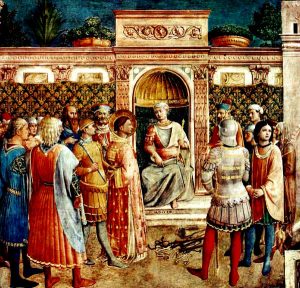 In the 320s, the Roman emperor Constantine made the critical decision to create his new capital in the East. The new capital, Constantinople, came to occupy the site of an old Greek town and would forever be changed by the emperor’s choice.
In the 320s, the Roman emperor Constantine made the critical decision to create his new capital in the East. The new capital, Constantinople, came to occupy the site of an old Greek town and would forever be changed by the emperor’s choice.
According to Richard Krautheimer, the reason he made the move was (at least in part) in order to create a new, Christian capital – one which was free from the attachments of old, entrenched pagan families who occupied the city of Rome. During the early years of his reign, Constantine respected pagan sensibilities by building the Christian churches of St. John Lateran and Old St. Peter’s in the far reaches of the city, away from the more visible spaces that were closer to the Palatine, Viminal, Esquiline, and Caelian Hills. This was not enough, though, as Krautheimer suspects the tension between the old and new religion helped lead Constantine to search for his new capital in the East.
What would have happened if Constantine never moved to Constantinople?

Let’s speculate with some generalities.
Civil unrest in Rome throughout the fourth century
The decline in population that the empire suffered beginning in the third century and the growing threats from barbarians to the north in the fourth century would have made Rome a turbulent place to live. Constantine’s Christianity would have continued to ruffle feathers with the pagan elites of the time, and this could have ballooned into ongoing civil problems. We already know that Constantine faced opposition from other Romans prior to his move to Constantinople, and if he never made the move there we can imagine this opposition would have worsened. Eventually this unrest could have subsided, but likely under authoritarian rule by the governing emperors who succeeded Constantine. Nevertheless….
The Western Roman Empire would have remained intact into the sixth or seventh century
The simple presence of imperial power in Italy would have served to prolong the power of Rome. Yes, the borders would have been in disarray, and the empire would have shrunk to a fraction of its size under Trajan, but the heart of the empire would have remained intact for a longer period of time. Rome would not have been sacked in 410 A.D. I think the Roman Empire would have continued into the sixth century at least because Rome wouldn’t have suffered the kind of population bleed that it did in late antiquity. As Krautheimer mentions, Rome’s population took a nosedive in the fifth century, falling from a population of 800,000 to only 100,000. There’s no doubt much of the population collapse was due to the collapse of the Roman system of government in and around the city after the influx of barbarian invaders. Had Constantine (and his successors) planned out a strategic vision for preserving Rome at all costs, barbarians might have been repelled and the population spared its demise. A larger fifth century population would then have propelled successes into the future, leaving barbarian groups at the gates somewhere near the Alps.
The eastern Mediterranean would have been overrun by Muslims by the seventh century

I think it goes without saying that the Byzantine Empire served as Europe’s guardian against Muslim invasion in the early medieval period. Without a Byzantine presence, Islamic expansion could have continued through Anatolia and into eastern Europe, advancing possibly until facing resistance from the Slavs or some other group in the area. Because of this, Islamic expansion through western North Africa would have been weaker and expansion into Spain might never have materialized.
The religious makeup of the Mediterranean would have been vastly different
One of the likely reasons why Constantine moved to Constantinople was that the eastern region of the empire was home to a greater number of Christians. Christianity grew out of cities such as Jerusalem, Damascus, Ephesus, and Antioch, and these kinds of places could support the emperor’s building and policy decisions. But without an imperial presence in the east to protect against Islamic expansion, what would become of these Christians in the east? It’s hard to say. Would all traces of Christianity be wiped out? Would the push of Muslim forces to the west of Constantinople create a weakened, diluted Islam that would falter over time? And if Muslim forces never crossed the Strait of Gibraltar, would the Iberian Peninsula have developed as a relatively remote center of Christian learning and art? Whatever the case, there’s a good chance that the religious development of the Mediterranean would have developed very differently than it did.
The Franks would have been a weaker version of what they became in the eighth and ninth centuries
Barbarian groups to the north would have coalesced to some degree since by the sixth or seventh century the Roman Empire’s borders would have vastly shrunk. If the Roman Empire managed to survive into the eighth century, the Frankish kingdom would still have existed but would have not extended to Carolingians. Other groups that entered Italy, such as the Ostrogoths and the Lombards, might have remained in the eastern part of Europe or migrated westward toward southern France.
The Vikings might have been wiped off the map by the early ninth century

A decision that changed history
It’s reasonable to conclude that Constantine’s decision to move to Constantinople was one that would reverberate throughout history. It’s interesting that the effects would not only have changed the area which would later become the Byzantine world, but also throughout western Europe. Suffice it to say, the cultural and political ramifications of Constantine’s move continue to influence even to this day.
 Rusticus the prefect said, Where do you assemble? Justin said, Where each one chooses and can: for do you fancy that we all meet in the very same place? Not so; because the God of the Christians is not circumscribed by place; but being invisible, fills heaven and earth, and everywhere is worshipped and glorified by the faithful. Rusticus the prefect said, Tell me where you assemble, or into what place do you collect your followers? Justin said, I live above one Martinus, at the Timiotinian Bath; and during the whole time (and I am now living in Rome for the second time) I am unaware of any other meeting than his. And if any one wished to come to me, I communicated to him the doctrines of truth. Rusticus said, Are you not, then, a Christian? Justin said, Yes, I am a Christian.
Rusticus the prefect said, Where do you assemble? Justin said, Where each one chooses and can: for do you fancy that we all meet in the very same place? Not so; because the God of the Christians is not circumscribed by place; but being invisible, fills heaven and earth, and everywhere is worshipped and glorified by the faithful. Rusticus the prefect said, Tell me where you assemble, or into what place do you collect your followers? Justin said, I live above one Martinus, at the Timiotinian Bath; and during the whole time (and I am now living in Rome for the second time) I am unaware of any other meeting than his. And if any one wished to come to me, I communicated to him the doctrines of truth. Rusticus said, Are you not, then, a Christian? Justin said, Yes, I am a Christian.


